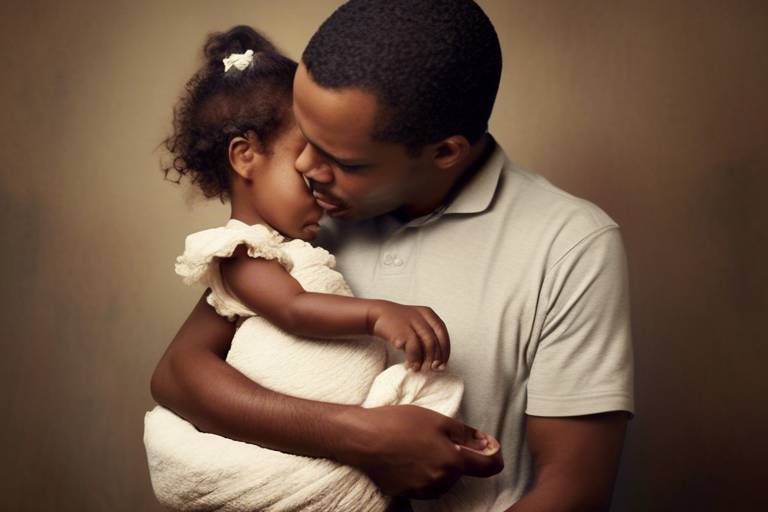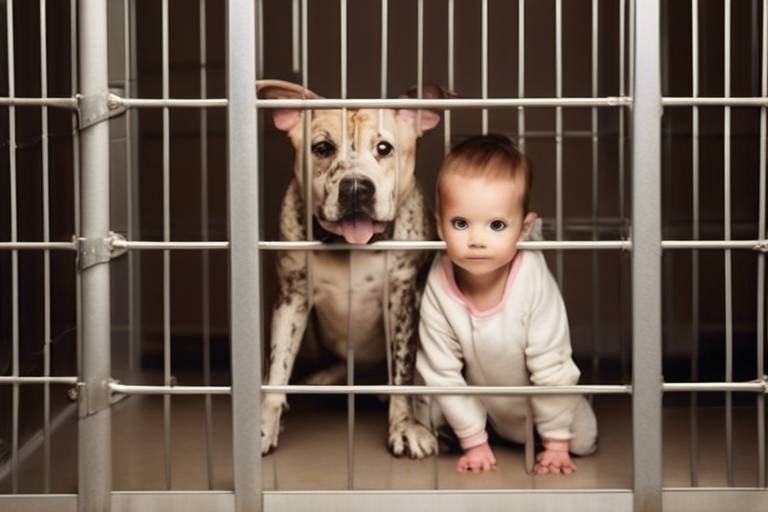Understanding the Adoption Process - What to Expect
Adopting a child is one of the most profound decisions a person or couple can make. It’s not just about welcoming a new member into your family; it’s about creating a safe, loving environment for a child who needs it. The adoption process can feel overwhelming at times, but understanding what to expect can help ease your journey. From the initial steps of research and choosing an agency to the emotional rollercoaster of the home study and finalizing the adoption, each phase is crucial. So, let’s dive into this adventure together and explore what lies ahead!
Before diving into the adoption process, it's essential to understand the initial steps, including research, choosing an adoption agency, and determining the type of adoption that best suits your family. First and foremost, you’ll want to do your homework. Research different types of adoption—domestic, international, foster care, and relative adoption. Each comes with its own set of rules, timelines, and emotional considerations.
Next, selecting the right adoption agency is pivotal. Not all agencies are created equal, and finding one that aligns with your values and needs can make a world of difference. Look for agencies that are accredited and have a good reputation. Reading reviews and speaking with other adoptive families can provide valuable insights into their experiences. Remember, this agency will be your partner throughout the journey, so choose wisely!
Lastly, consider the type of adoption that resonates with you. Are you open to adopting a child from another country, or do you prefer to adopt domestically? Each option has its own unique challenges and rewards. By defining your preferences early on, you can streamline the process and focus on what truly matters—finding your child.
The home study is a crucial component of adoption. This evaluation is not just a formality; it’s a comprehensive assessment of your home environment, lifestyle, and readiness to become a parent. During this process, a social worker will visit your home, interview you, and gather necessary documentation. You’ll need to provide things like background checks, financial statements, and references. It might sound intimidating, but think of it as an opportunity to showcase your family’s strengths and your commitment to providing a nurturing home.
Preparation for the home study can significantly impact its outcome. Here are some tips on how to organize your home and gather necessary documents:
- Declutter and Clean: A tidy home reflects your readiness to provide a safe environment.
- Gather Documentation: Collect all required documents like medical records, financial statements, and personal references.
- Practice Your Answers: Anticipate questions the social worker may ask and think about how to convey your parenting philosophy.
Remember, the home study is not just about scrutinizing your home; it’s about understanding your family dynamics and your desire to adopt.
During the home study, social workers often ask specific questions. Here are some common inquiries you might encounter:
- What motivated you to adopt?
- How do you plan to handle challenges that may arise?
- What is your parenting style?
These questions help evaluators understand your mindset and readiness to become a parent. Be honest and open; it’s all part of the process!
Many prospective parents have concerns about the home study process. It’s completely normal to feel anxious! Common worries include the fear of judgment or not being deemed “suitable.” To alleviate these fears, approach the home study as a conversation rather than an interrogation. Remember, social workers are there to support you and ensure that you are prepared for the journey ahead.
Selecting an adoption agency is a significant decision. Look for agencies that offer the following:
- Accreditation: Ensure the agency is licensed and recognized.
- Services Offered: Consider what support services they provide, such as counseling and post-adoption support.
- Agency Philosophy: Choose an agency that aligns with your values and beliefs about adoption.
Once approved, the matching process begins. This is where the magic happens! You’ll be paired with a child based on various factors such as age, background, and your family’s preferences. It’s important to understand that this process can take time, and it’s not uncommon for it to feel like a waiting game. But rest assured, every moment spent waiting is a moment closer to meeting your child.
Different agencies have varying criteria for matching children with adoptive families. Factors that can affect the matching process include:
- Age and gender preferences
- Special needs considerations
- Cultural or ethnic background
Understanding these criteria can help you align your preferences with the available children, making the matching process smoother and more fulfilling.
Finalizing the adoption is the last step in the process. This is where all your hard work pays off! The legal aspects involved can seem daunting, but your agency will guide you through the finalization hearing. This is a moment of celebration, marking the official transition of a child into your family. You’ll want to capture this moment—consider throwing a small celebration with family and friends to honor this significant milestone.
Q: How long does the adoption process take?
A: The timeline varies widely based on the type of adoption, the agency, and individual circumstances. It can take anywhere from a few months to several years.
Q: What are the costs associated with adoption?
A: Adoption costs can vary significantly depending on the type of adoption. Domestic adoptions may range from $20,000 to $50,000, while foster care adoptions are often less expensive.
Q: Can I adopt if I am single?
A: Yes! Many single individuals successfully adopt children. Agencies assess each applicant based on their ability to provide a loving home.

The Initial Steps of Adoption
Embarking on the journey of adoption is like setting sail on an exciting yet unpredictable ocean. The initial steps are crucial in laying the foundation for a successful adoption experience. First and foremost, it's vital to conduct thorough research. This means diving deep into understanding the different types of adoption available, such as domestic, international, or foster care adoption. Each type comes with its own set of regulations, requirements, and emotional considerations. By familiarizing yourself with these options, you can better determine which path aligns with your family's values and circumstances.
Next, choosing the right adoption agency is a significant step that can influence your entire adoption journey. Not all agencies are created equal, and it's essential to find one that resonates with your philosophy and approach to parenting. Look for agencies that are accredited and have a good reputation in the community. Consider scheduling interviews with multiple agencies to get a feel for their services, support systems, and overall approach. This is not just a business transaction; it’s about finding a partner who will guide you through this life-changing experience.
After selecting an agency, you’ll need to determine the type of adoption that best suits your family. This decision will impact everything from the age of the child to the level of openness in the adoption. Are you looking to adopt a newborn, a toddler, or an older child? Each age group comes with unique challenges and rewards. Additionally, consider whether you want an open or closed adoption, as this will influence your relationship with the birth family and the child’s background.
As you navigate these initial steps, remember that the adoption process is not just a legal transaction—it's an emotional journey. It’s normal to feel a mix of excitement and anxiety as you prepare to welcome a new member into your family. Be patient with yourself and your partner, and take the time to discuss your feelings, hopes, and fears. Open communication will not only strengthen your relationship but also prepare you for the challenges ahead.
In summary, the initial steps of adoption involve a combination of research, agency selection, and self-reflection. The decisions you make during this phase will set the stage for the rest of the adoption process. So, take a deep breath, trust the process, and remember that every step brings you closer to the moment you’ll hold your child in your arms.

Home Study Requirements
The home study is a pivotal step in the adoption process, serving as a comprehensive evaluation of your family and home environment. It's not just a formality; it's a deep dive into your life, values, and readiness to welcome a child into your family. Understanding the requirements and what to expect can help ease your mind and prepare you for this important assessment.
Typically, the home study involves several components, including background checks, interviews, and home visits. You’ll need to provide various documents that showcase your ability to provide a safe and nurturing environment for a child. This can include:
- Proof of income and employment
- Medical records
- References from friends and family
- Criminal background checks
- Home safety inspections
Each state has its own regulations regarding home study requirements, so it's crucial to familiarize yourself with the specific laws in your area. Generally, the process is designed to ensure that you can provide a loving and stable home for a child, and it may take several weeks to complete. This timeline can vary based on your agency and how quickly you can gather the necessary documentation.
During the home study, a social worker will typically conduct interviews with all family members who live in the household. They want to understand your family dynamics, parenting philosophies, and overall readiness to adopt. This is a chance for you to express your hopes and dreams for your future family. Remember, this is not a test; it's an opportunity for the social worker to get to know you and assess your suitability as an adoptive parent.
To prepare for the home study, it's beneficial to create a welcoming environment in your home. Here are some tips to help you get ready:
- Declutter your living space to create a comfortable atmosphere.
- Ensure that your home meets safety standards, such as having smoke detectors and childproofing where necessary.
- Gather all required documents in advance to avoid last-minute stress.
- Practice answering common questions that may arise during the interview.
By taking these steps, you can present yourself as a responsible and caring prospective parent, which can positively influence the outcome of your home study.
As you prepare for the home study, it's helpful to know what kinds of questions you might face. Social workers often ask about your parenting style, your understanding of the adoption process, and how you plan to address the child's needs. Here are a few common questions:
- What motivated you to pursue adoption?
- How do you plan to handle any potential challenges that may arise?
- What support systems do you have in place?
- Can you describe your family dynamics?
These questions are designed to gauge your readiness and commitment to adopting a child. Being honest and open in your responses can help build trust with the social worker and demonstrate your preparedness.
It's natural to feel anxious about the home study process. Many prospective parents worry about being judged or whether they will meet the necessary criteria. Remember, the goal of the home study is to ensure the best placement for the child, not to scrutinize your life. If you have specific concerns, it’s best to address them upfront with your social worker. They can provide guidance and reassurance throughout the process.
In summary, the home study is a critical part of the adoption journey that requires preparation, honesty, and a willingness to share your life with a social worker. By understanding the requirements and addressing any concerns, you can approach this step with confidence and clarity.
Here are some common questions regarding the home study process:
- How long does the home study take? The duration can vary, but it typically takes a few weeks to complete.
- Can I fail the home study? While you may not be approved initially, the process is designed to help you succeed. You can often address any concerns and reapply.
- What if I have pets? Pets are generally welcomed, but you may need to demonstrate that they are well cared for and that your home is safe for children.
Preparing for the Home Study
Getting ready for a home study can feel like preparing for an intense job interview, but with a lot more emotional stakes involved. It's not just about tidying up your living space; it’s about showcasing your home as a loving and nurturing environment for a child. Think of it as an opportunity to present the best version of your family. You'll want to create a welcoming atmosphere that reflects your values and readiness to adopt.
First things first, take a good look around your home. Is it a place where you can envision a child growing, playing, and thriving? Start by organizing your space. This doesn't mean you have to live in a magazine-worthy home; rather, it should be clean, safe, and inviting. Make sure to declutter, especially in areas where the social worker will be assessing your home. Remember, this is about creating a safe haven for a child, so focus on child-proofing areas that might be hazardous.
Next, gather all necessary documentation ahead of time. Having everything organized can ease a lot of stress. Documents typically required include:
- Proof of income
- Medical records
- Background checks
- References from friends or family
- Home safety inspection reports
Organizing these documents in a binder can make a great impression. It shows that you are serious about the process and ready to embrace the responsibilities of parenthood. Additionally, be prepared to discuss your parenting philosophy and how you plan to handle challenges that may arise. Social workers are not just looking for a clean home; they want to see that you have thought deeply about what it means to be a parent.
Another crucial aspect is to have open conversations with your family about the home study. It’s essential that everyone in your household understands the process and feels comfortable. This can help alleviate nerves and ensure that your family presents a united front. Have discussions about what the social worker might ask and how each family member can contribute to a positive atmosphere during the visit.
Lastly, don't forget to be yourself! The home study is an opportunity for the social worker to get to know you as a person and as a family. Authenticity goes a long way in this process. Be honest about your strengths and weaknesses, and don’t hesitate to express your excitement about adopting. Remember, the goal is to find the best match for both you and the child, so showing your genuine self can help facilitate that connection.
In summary, preparing for a home study involves creating an inviting environment, organizing necessary documentation, having open family discussions, and being your authentic self. By approaching the home study with confidence and clarity, you can turn what seems like a daunting task into a meaningful step towards welcoming a child into your home.
What should I do if my home isn't perfect?
It's important to remember that no home is perfect. Social workers understand this. Focus on cleanliness and safety rather than perfection.
How long does the home study process take?
The home study process can vary, but typically it takes a few weeks to a couple of months, depending on your local regulations and the availability of your social worker.
Can I prepare my children for the home study?
Absolutely! Talk to your children about the process and what to expect. Encourage them to share their thoughts and feelings, which can help them feel more involved.
Common Home Study Questions
When embarking on the adoption journey, the home study can feel like a daunting hurdle. It's a critical step that evaluates your readiness to be an adoptive parent, and understanding the common questions asked during this process can help ease your nerves. Social workers are not there to judge you; rather, they're looking to understand your life, values, and parenting philosophy. They want to ensure that you can provide a safe and nurturing environment for a child. So, what kind of questions can you expect?
Generally, the questions can be grouped into several categories. These include:
- Personal Background: Expect inquiries about your childhood, education, and work history. Social workers want to know who you are beyond the surface.
- Family Dynamics: Questions about your family structure, relationships with family members, and how your family supports your decision to adopt are common.
- Parenting Philosophy: Be prepared to discuss your views on discipline, education, and how you plan to raise the child.
- Home Environment: They may ask about your living situation, including the safety and suitability of your home for a child.
For example, a social worker might ask, “What values do you hope to instill in your child?” This question not only gauges your parenting philosophy but also opens the door for a deeper conversation about your hopes and dreams for your future family. Another common question could be, “How do you handle conflict within your family?” This helps the evaluator understand how you communicate and resolve issues, which is essential for a healthy family dynamic.
Moreover, you might be asked about your support system. Questions like, “Who do you rely on for help and guidance?” can reveal the network of support you have in place, which is vital for any parent. This is a great opportunity to showcase your community ties and any resources you have available, such as family, friends, or parenting groups.
It’s important to remember that honesty is key during the home study. Social workers appreciate transparency and are more interested in your genuine responses than in a perfect picture. They want to see how you reflect on your experiences and how you plan to navigate the challenges of parenthood. So, take a deep breath, be yourself, and view this as a chance to share your story.
In conclusion, while the home study may seem intimidating, it's simply a way for social workers to get to know you better. Think of it as a conversation rather than an interrogation. Prepare yourself with thoughtful answers, and don’t hesitate to express your emotions and aspirations. After all, this process is about finding the right match for both you and the child who will soon become a part of your family.
As you prepare for the home study, you might have some lingering questions. Here are a few frequently asked questions that can provide additional clarity:
- What should I do to prepare for the home study? Organize your home, gather necessary documents, and reflect on your parenting philosophy.
- How long does the home study process take? The duration can vary, but it typically spans several weeks to a few months.
- Will my home be inspected? Yes, social workers will assess your home for safety and suitability for a child.
Addressing Concerns in the Home Study
The home study process can feel like a daunting mountain to climb, especially for first-time prospective parents. It’s completely normal to have a whirlwind of emotions and concerns swirling around in your mind. You might be asking yourself, “Will they think my home is clean enough?” or “What if I don’t have all the answers?” Let’s take a deep breath together and tackle these worries head-on.
First off, it’s important to remember that the home study isn’t about judging your ability to be a parent based on the size of your home or the tidiness of your living room. Instead, it’s an opportunity for social workers to understand your family dynamics, lifestyle, and readiness to adopt. They are there to support you, not to scrutinize every little detail. Think of them as guides on your journey rather than critics.
You might be concerned about personal questions that could come up during the home study. Social workers often delve into topics like your childhood, relationship history, and parenting philosophies. While this might feel invasive, these questions are designed to help them gauge your motivations and preparedness for adoption. To ease your anxiety, consider jotting down your thoughts and feelings about these topics beforehand. It can be a great way to articulate what you want to share.
Another common worry is the fear of not having all the required documentation in order. This can include financial statements, medical records, and background checks. To tackle this concern, create a checklist of documents you’ll need. Here’s a sample checklist to get you started:
| Document Type | Description |
|---|---|
| Financial Statements | Proof of income and financial stability. |
| Medical Records | Health evaluations for all family members. |
| Background Checks | Criminal history checks for all adults in the home. |
| References | Letters from friends or family who can vouch for your character. |
This table can serve as a roadmap to ensure you have everything ready before the home study. Moreover, it helps to be proactive and reach out to your adoption agency for specific requirements, as they can vary.
Lastly, many prospective parents worry about how their home will be perceived. You might think, “What if my house isn’t perfect?” Remember, the home study is not about creating a picture-perfect environment; it’s about creating a safe and loving space for a child. Instead of stressing over minor details, focus on showing your home’s warmth and welcoming atmosphere. A clean, organized, but lived-in space is what they are looking for.
In conclusion, addressing these concerns is crucial for your peace of mind. The home study is merely a step in your journey to becoming an adoptive parent, and with the right preparation and mindset, it can be a positive experience. Embrace the process, and remember that you’re one step closer to welcoming a child into your heart and home.
Choosing the Right Adoption Agency
When it comes to adopting a child, selecting the right adoption agency can feel like finding a needle in a haystack. With so many options available, how do you know which agency is the best fit for your family? It's not just about picking the first name that pops up on your search engine; it's about finding a partner in this life-changing journey. You want an agency that resonates with your values, understands your needs, and can guide you through every twist and turn of the adoption process.
First things first, consider the accreditation of the agency. In the United States, agencies must comply with state and federal regulations to ensure the safety and well-being of children. Look for agencies that are licensed and accredited by recognized bodies, as this can provide a level of assurance regarding their practices. You might also want to check if the agency has a good track record. Reviews and testimonials from other adoptive parents can offer invaluable insights into their experiences.
Next, think about the services offered. Some agencies specialize in certain types of adoption, such as international, domestic, or foster care. Others may offer additional support services like counseling, parenting classes, and post-adoption support. Are you looking for a full-service agency that will walk you through every step, or do you prefer a more hands-off approach? Understanding what you need will help narrow down your choices.
Another critical factor to consider is the agency's philosophy regarding adoption. Each agency has its own approach, and aligning your values with theirs can make a significant difference. For instance, some agencies may prioritize open adoptions, while others might focus on closed adoptions. Ask yourself: What kind of relationship do you envision having with the birth family? It's essential to have this conversation early on to ensure everyone is on the same page.
Lastly, don't underestimate the importance of communication. A good agency should be transparent about their processes, fees, and what you can expect throughout your journey. During your initial meetings, pay attention to how they communicate. Are they responsive to your questions? Do they provide clear and detailed answers? The adoption process can be overwhelming, and having an agency that communicates effectively can ease a lot of your stress.
In summary, choosing the right adoption agency is a crucial step in your journey to parenthood. Take your time, do your research, and trust your instincts. After all, this agency will be your partner in bringing a child into your family, and you want to ensure that it’s a match made in heaven.
- What should I look for in an adoption agency? Look for accreditation, services offered, agency philosophy, and communication style.
- How do I know if an agency is reputable? Check for licenses, read reviews, and ask for references from other adoptive families.
- Can I switch agencies if I am not satisfied? Yes, but it's essential to consider the implications and ensure a smooth transition.

The Matching Process
Once you have successfully completed the home study and received approval, you enter one of the most exciting yet nerve-wracking phases of the adoption journey: the matching process. This is where the magic happens, and you start to envision your family growing. But what does this process entail? How do agencies connect you with a child who is just right for you? Let’s dive into the details.
The matching process is not merely about pairing a child with parents; it’s a thoughtful and nuanced approach that considers various factors. Each adoption agency has its own set of criteria for matching children and families, which can include age, ethnicity, special needs, and even parenting styles. This is where your preferences come into play. You’ll be asked to fill out a detailed profile that outlines what you’re looking for in a child. Think of it as creating a resume, but instead of job qualifications, you’re highlighting your family values, lifestyle, and what you hope to offer a child.
Factors that influence the matching process can vary widely and may include:
- Child’s Needs: The needs of the child, including any medical or emotional considerations, are paramount. Agencies strive to ensure that children are placed in homes where their needs can be met effectively.
- Family Dynamics: Your family structure, including the ages of any existing children, can impact the match. Agencies often look for compatibility to ensure a smooth transition.
- Parenting Philosophy: Different families have different approaches to parenting. Understanding your philosophy helps agencies find a match that aligns with your views on discipline, education, and lifestyle.
Once you’ve submitted your profile and preferences, the agency will begin the matching process. They will review available children and start to identify potential matches. You may find yourself in a waiting game, which can be both thrilling and daunting. It’s important to remember that this process can take time. Patience is key, as the right match is worth the wait.
When a potential match is identified, the agency will typically present you with a profile of the child, which may include background information, medical history, and any known preferences or needs. This is your opportunity to ask questions and get to know the child before moving forward. If you feel a connection and decide to proceed, the agency will facilitate meetings, allowing you to spend time together and see if it feels like a fit.
Throughout this process, communication is essential. Stay in close contact with your adoption agency, as they can provide support and guidance. They are there to help you navigate any challenges that arise and to ensure that both you and the child are ready for the next steps.
Finally, once a match is made, you’ll enter the transition phase, where the child may spend time in your home before the adoption is finalized. This stage is crucial as it allows everyone to adjust and build a bond. Think of it as a trial period, where both you and the child can get used to each other’s presence and create a sense of family before the legalities are finalized.
In summary, the matching process is a pivotal moment in your adoption journey. It’s filled with anticipation and hope as you prepare to welcome a new member into your family. By understanding the factors involved and maintaining open communication with your agency, you can navigate this exciting phase with confidence.
1. How long does the matching process typically take?
The duration of the matching process can vary widely depending on numerous factors, including the agency's resources, the specific needs of the child, and your preferences. It can take anywhere from a few weeks to several months.
2. Can I choose the age or background of the child I want to adopt?
Yes, during the matching process, you will have the opportunity to specify your preferences regarding the age, background, and needs of the child. However, the ultimate match will depend on the children available for adoption at that time.
3. What happens if the first match doesn’t work out?
If the initial match does not feel right or doesn’t work out for any reason, don’t worry. Agencies are experienced in handling such situations, and they will continue to support you in finding a more suitable match.
Understanding the Match Criteria
When it comes to adoption, the matching process is a pivotal moment that can feel both exhilarating and daunting. It’s like trying to find the perfect puzzle piece that fits into your family picture. But what exactly does it entail? Understanding the match criteria is crucial for prospective parents as it helps align your hopes and dreams with the realities of available children.
Every adoption agency has its own set of criteria that guides the matching process. These criteria can vary widely, but they often include factors such as the age of the child, their background, and the specific needs they may have. For instance, some families may feel more equipped to adopt a toddler, while others might be open to adopting an older child or a sibling group. This is where your personal preferences play a significant role.
Additionally, the agency will consider the family dynamics and lifestyle of the prospective parents. They want to ensure that any child placed in your care will thrive in your environment. This includes evaluating your parenting style, your family’s daily routine, and even your geographical location. For instance, if you live in a bustling city, the agency might consider how that environment would suit a child who has only known a quieter, rural life.
Moreover, the emotional and psychological readiness of both the child and the adoptive parents is a critical component. Agencies often look for signs that families are prepared to meet the emotional needs of a child who may have experienced trauma or instability in their past. This could involve discussions about how you plan to support the child through their adjustment period, which can sometimes be challenging.
To help you better understand what criteria might be involved, here’s a brief overview of common factors that agencies might consider:
- Age of the Child: Preferences for infants, toddlers, or older children.
- Background: Consideration of the child’s cultural, racial, or ethnic background.
- Special Needs: Openness to adopting children with physical, emotional, or developmental challenges.
- Family Structure: Existing children in the home and how they might interact with a new sibling.
- Location: Proximity to the agency and the child’s current placement.
It's essential to have open and honest conversations with your adoption agency about your preferences and any concerns you might have. This dialogue not only helps the agency understand your family better but also sets the stage for a successful match. Remember, this is not just about finding a child to adopt; it's about creating a lifelong bond that will enrich both your lives.
In conclusion, understanding the match criteria is a multi-faceted process that involves introspection, discussion, and a willingness to adapt. The right match can lead to a fulfilling and joyous family experience, while the wrong one can create challenges that may be difficult to navigate. Therefore, take your time, communicate openly with your agency, and trust that the right child is out there waiting for you.
1. What is the typical age range of children available for adoption?
Most agencies have children ranging from infants to teenagers, with a significant number of children in the school-age range.
2. Can I specify the gender of the child I want to adopt?
Yes, many families express a preference for the gender of the child, but it’s important to remain flexible.
3. How long does the matching process usually take?
The timeline can vary significantly based on the type of adoption and the specific agency, but it can take anywhere from a few months to several years.
4. What if I have concerns about adopting a child with special needs?
Discuss your concerns with your agency. They can provide resources and support to help you make an informed decision.
5. How can I prepare for the emotional challenges of the matching process?
Consider joining support groups or speaking with other adoptive parents to gain insights and coping strategies.

Finalizing the Adoption
Finalizing the adoption is the exciting culmination of a long journey filled with anticipation and hope. This is the moment when all the hard work, emotional ups and downs, and the immense love you've built for your child come together in a beautiful way. But what does this final step really entail? Let’s break it down.
First and foremost, it's important to understand that finalization is a legal process. This means that there are specific legal requirements and procedures that must be followed to officially make your child a permanent member of your family. Typically, this process involves a court hearing where a judge will review your case and ultimately grant the adoption. It’s a bit like a mini-celebration, where you get to affirm your commitment to your child in front of a legal authority.
During the finalization hearing, you can expect several things to happen:
- Documentation Review: The judge will review all the necessary documents that have been prepared throughout the adoption process. This includes the home study report, background checks, and any other relevant paperwork.
- Testimony: In some cases, you may be asked to provide testimony about your relationship with the child and your readiness to be a parent. This is your chance to share your story and express your love and commitment.
- Legal Decree: If everything goes smoothly, the judge will issue a decree of adoption, which legally recognizes your child as part of your family.
After the hearing, you’ll receive an official adoption certificate. This document is more than just a piece of paper; it symbolizes the bond you’ve created and the new life you’re embarking on together. You might even want to frame it as a reminder of this incredible milestone!
In addition to the legal aspects, finalizing the adoption is also a time for celebration. Many families choose to commemorate this special day with a small gathering, inviting friends and family to share in the joy. Whether it’s a simple cake at home or a larger celebration, this is an opportunity to welcome your child into your family in a meaningful way.
However, it’s essential to remember that the journey doesn’t end here. While the legalities are completed, the emotional and relational work continues as you build your family together. Adoption is a lifelong process, filled with learning, love, and growth. Embrace every moment, and don’t hesitate to seek support when needed.
As you navigate this final stage, you may have some questions. To help ease any uncertainties, we’ve included a Frequently Asked Questions section below to address common queries regarding the finalization process.
- What should I bring to the finalization hearing? It's advisable to bring all required documentation, including your adoption petition, home study report, and any other legal documents. Additionally, consider bringing a camera to capture the moment!
- Can I have family and friends attend the hearing? Yes! Many families invite loved ones to witness this special occasion. Just check with your adoption attorney or agency to ensure there are no restrictions.
- What happens after the adoption is finalized? After finalization, you’ll receive your adoption certificate, and you can begin updating records such as birth certificates and Social Security numbers.
Frequently Asked Questions
- What are the initial steps I need to take to start the adoption process?
Starting the adoption process can feel overwhelming, but it all begins with research. You'll want to explore different types of adoption, such as domestic, international, or foster care adoption. Once you have a good grasp on your options, the next step is to choose an adoption agency that aligns with your values and needs. Look for agencies that are accredited and have a good track record. Don't hesitate to reach out and ask questions!
- What is a home study, and why is it important?
A home study is a comprehensive evaluation of your home and family to ensure you’re ready for adoption. This process typically involves interviews, background checks, and home visits. It’s crucial because it not only assesses your suitability as adoptive parents but also provides you with valuable insights into what to expect in your parenting journey. Think of it as a way to prepare both you and the child for a successful transition.
- How can I prepare for the home study?
Preparation is key for a successful home study! Start by organizing your home; a clean, welcoming space can make a great impression. Gather necessary documents like financial statements, medical records, and references. Practice answering common questions that social workers might ask. Remember, they want to know about your parenting philosophy and how you plan to support a child emotionally and physically.
- What should I expect during the matching process?
Once your home study is approved, the matching process begins! This is where the agency works to find a child who fits your family’s needs and preferences. Expect to discuss your values, lifestyle, and what you envision for your family. The agency will consider various factors, including the child's background and needs, to make the best match possible.
- How do I finalize the adoption?
Finalizing the adoption is the exciting last step! This involves a legal process where you’ll appear in court to finalize your parental rights. The judge will review your case, and if all goes well, you’ll receive a final decree of adoption. It’s a moment filled with joy, so don’t forget to celebrate this incredible milestone with your family and friends!
- What are some common concerns about the home study process?
It’s natural to have concerns about the home study process. Many prospective parents worry about being judged or not meeting expectations. Remember, social workers are there to support you, not to criticize. They understand that every family is unique. Focus on being honest and open during the process; it’s all about finding the right fit for the child and your family.



















